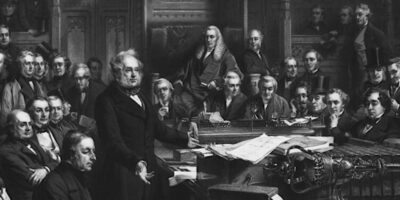The Fallacy of Us, We, and Our
Deirdre McCloskey never tires of reminding her readers that words matter. She’s right to do so.
The words and phrases that we use are not neutral vessels, akin to shipping containers, for transporting thoughts and ideas. Unlike shipping containers which assist only in altering the location of their cargoes but do nothing to change the substance of those cargoes, words and phrases not only transport thoughts and ideas from mind to mind, they also affect the substance of the thoughts and ideas that they transport. Special care must therefore be exercised when choosing our words. Absent such care, we’re likely to mislead not only others but also ourselves.
Here are two examples – one specific, the other general – of words and phrases that easily mislead.
“National Income”
This technical meaning of “national income” is quite innocent. National income is simply the summation of the incomes of each and every American resident – which, in fact, is what economists and statisticians will tell you “national income” means. But use of this term often conveys impressions very different from its technical meaning.
First, talk of “national income” risks creating the mistaken impression that the earning of this income results from conscious decision-making and planning – decision-making and planning similar to that of members of the Jones household who consciously decide which careers to pursue and how to allocate the time of both Mr. and Ms. Jones between working in the market to earn monetary incomes and working at home to produce household outputs.
Second, the term “national income” is too easily interpreted as referring to income that we possess collectively and, therefore, that we can consciously spend as a collective entity. That is, “national income” is too easily mistaken to be analogous to household income: just as the household income of the Joneses is owned, and available to be spent, collectively by the Joneses, the national income of Americans is regarded – wrongly – as being owned, and available to be spent, collectively by Americans.
This misimpression has serious consequences. I recently heard a pundit insist that we Americans should stop worrying about Uncle Sam’s indebtedness because U.S. GDP – America’s “national income” – is sufficiently high that we can easily bear the burden of this debt.
My purpose here isn’t to compare the size of Uncle Sam’s debts to that of America’s national income. Even if (contrary to fact) the pundit were correct that the U.S. government’s debt obligations are small relative to America’s national income, the pundit is incorrect to imply that America’s national income is a sum owned collectively by us and out of which we can repay Uncle Sam’s creditors.
Unlike the Jones’s household income which is owned and spent collectively by the Jones, America’s national income is not owned and spent collectively by Americans. Put differently, while it makes sense – both economically and legally – to regard the household income of the Jones as belonging collectively to the members of the Jones household, it makes no sense, economically or legally, to regard the national income of America as belonging collectively to citizens of the American nation.
Personal Pronouns
Personal pronouns are often sources of awful mischief when used to describe countries, societies, and other collectives. This reality is especially true for first-person plural pronouns, which in English are four: “we,” “us,” “our,” and “ours.”
An example of such a dangerous use of pronouns is “our trade balance.” A host of fallacies infect discussions of a country’s so-called “trade balance,” but one fallacy in particular is relevant here – namely, the fallacy that there is a collective trade balance. Such a thing exists only in words and not in reality.
Statisticians, of course, assemble figures for each country’s “balance of trade” (or “balance of payments”). But these figures are merely sums of the independent purchases, sales, and investments of each individual and firm located within the boundaries of each country.
My household, that of Don Boudreaux, has a trade balance. So too does the household of Mary Centanni, my sister. So too, does the household of my student Linan Peng. So too does the household of…. I can go on to name the household of all Americans, as well as name all American for–profit and non–profit organizations. The buying, selling, and investments of each of these units can then be summed to produce a figure called “America’s balance of trade.”
Yet this aggregate figure is not “our” trade balance in any economically or ethically meaningful sense. For example, any debts that I owe to a foreign creditor are not debts owed by my sister, by my student, or by any other American. Similarly for any debts owed to me by any foreigner.
Talk of “our” balance of trade is talk of something that doesn’t really exist; it’s merely a figment of the imagination made to appear real by an accounting convention that has the name “trade balance.” Nevertheless, this fictitious creature is daily demagogued by those seeking to clear the way for protectionist interventions.
I’m aware of no better warning of the dangers that lurk in the careless use of personal pronouns than that which was offered by Columbia University political scientist Parker T. Moon in his 1928 book, Imperialism and World Politics;
Language often obscures truth. More than is ordinarily realized, our eyes are blinded to the facts of international relations by tricks of the tongue. When one uses the simple monosyllable “France” one thinks of France as a unit, an entity. When to avoid awkward repetition we use a personal pronoun in referring to a country – when for example we say “France sent her troops to conquer Tunis” – we impute not only unity but personality to the country. The very words conceal the facts and make international relations a glamorous drama in which personalized nations are the actors, and all too easily we forget the flesh–and–blood men and women who are the true actors. How different it would be if we had no such word as “France,” and had to say instead – thirty-eight million men, women and children of very diversified interests and beliefs, inhabiting 218,000 square miles of territory! Then we should more accurately describe the Tunis expedition in some such way as this: “A few of these thirty-eight million persons sent thirty thousand others to conquer Tunis.” This way of putting the fact immediately suggests a question, or rather a series of questions. Who are the “few”? Why did they send the thirty thousand to Tunis? And why did these obey?
Essential questions indeed. Yet we will ask such essential questions only if we remain vigilantly aware of the dangers of being misled by loaded words and phrases.











